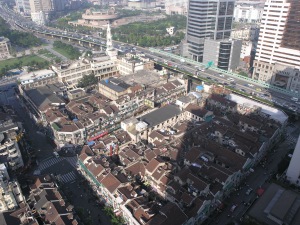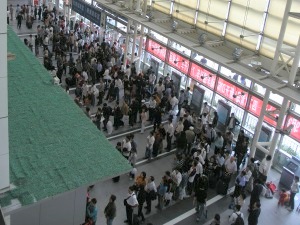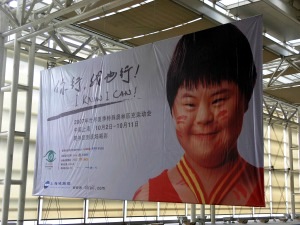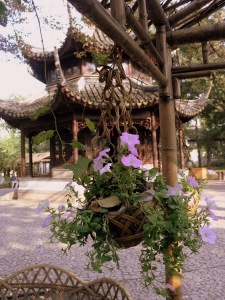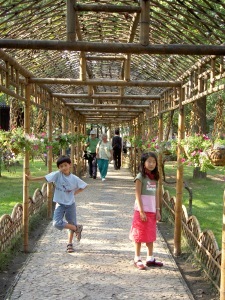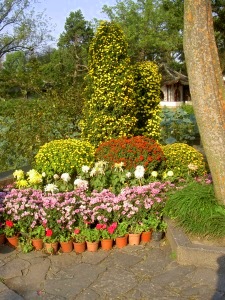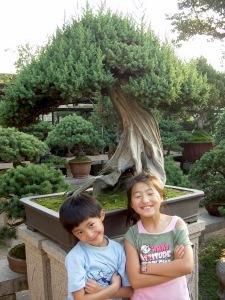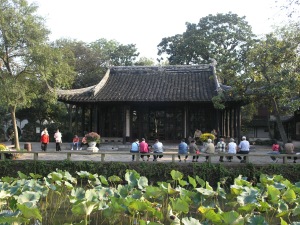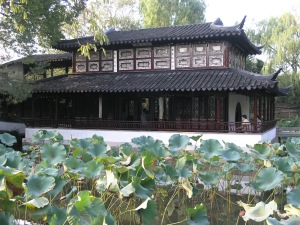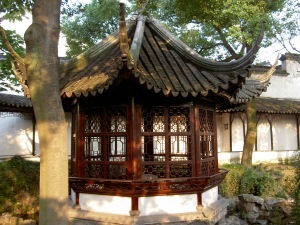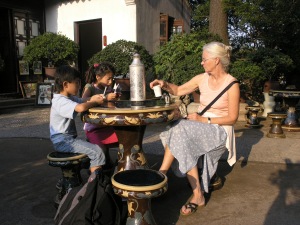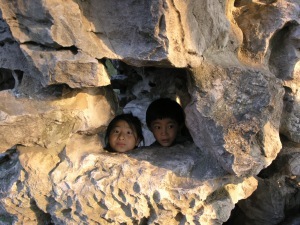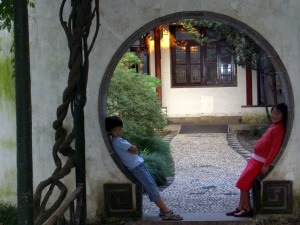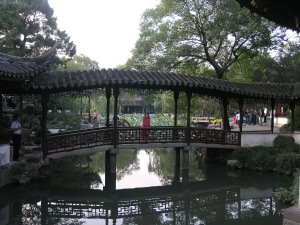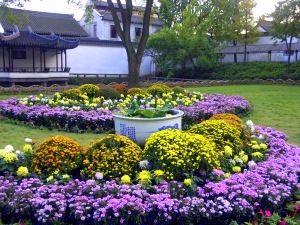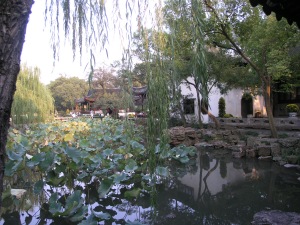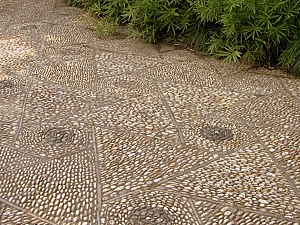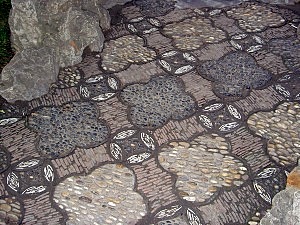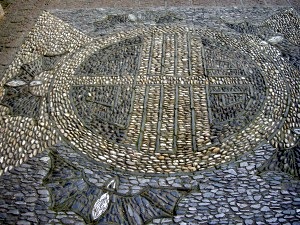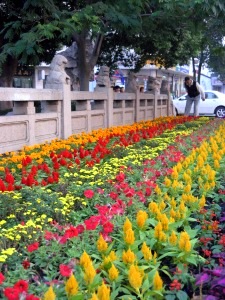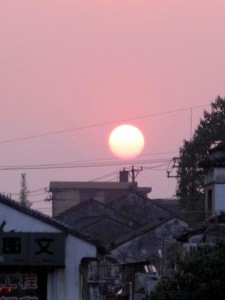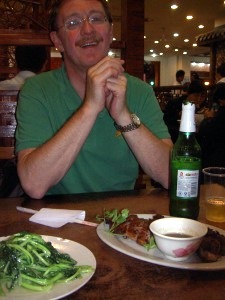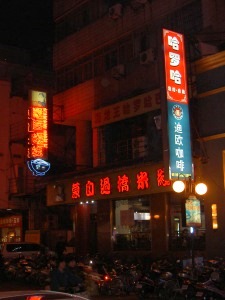|
Thursday
October 11th, 2007 |
Suzhou,
Sunny
– Max: 23; Min: 16; Avg:
20 |

We
took in the last views of Shanghai from our hotel room, breakfasted, checked out
and left the hotel for the station. The hotel wasn't in an area with lots of
taxis, so it took some time to get hold of one, but soon we were on our way. We
arrived at the station and stood in line at the ticket counter with a large
"English spoken" sign. There were probably 20 lines and 20 people in
each line. Now and then, someone tried to jump the queue, but a few sharp words
- at least that's how it sounded to us - and they sulked their way back into
line. We had no idea when the next train to Suzhou would leave, but
the people at the ticket counter seemed pretty effective, at least until we were
number three in line and suddenly they closed all the counters. The Chinese took
it all fairly calmly; the foreigners in our queue just couldn't understand it. A
Chinese-American told us it was because the computer system was down, so there
was nothing to do but wait patiently. After about 15 minutes, all the counters
were opened again, and we got our tickets for the 12:27 train to Suzhou.
We
had an hour to kill, but also our luggage, so we weren't very mobile. We made
straight for the waiting room and killed an hour, whilst we waited for the train
- Lene and I reading, Yanmei and Daji playing their Gameboy's. The journey took just over an hour and after leaving the Shanghai suburbs
the train sped through the countryside, with the occasional towns and factories
rolling by.
Suzhou
is a small Chinese city with a population of ca. 6 million (more than the whole
population of Denmark). It lies on the lower reaches of the Yangtze River. The
city is known as the Venice of the East due to the many canals that run through
the city and is famous for its many gardens, pagoda's and silk production. It
also lies on the Grand Canal that runs from Beijing to Hangzhou, the
longest ancient artificial canal or river in the world. Suzhou is the 5th most
prosperous city in China.
A
taxi took us from the station in the north of the city, to our hotel, the Bamboo Grove
Hotel, which was situated in the south of the city. Only then did we realise how
large the city actually is. Without really being stuck in traffic, it took us
about 30 minutes to get from the station to the hotel. We checked in and
unpacked our things and left in a taxi for the Humble Administrators Garden, the
largest garden in Suzhou, and generally considered the finest garden in southern
China. The garden contains numerous pavilions and bridges set among a maze of
connected pools and islands. It consists of three major parts set about a large
lake: the central part (Zhuozheng Yuan), the eastern part (once called
Guitianyuanju, Dwelling Upon Return to the Countryside), and a western part (the
Supplementary Garden).
When
I was dragged along to visit gardens as a child, I remember seeing large green
lawns and multi-coloured floral exhibits. Nothing could be further from a
Chinese garden, which is generally green, but with lots of buildings, paths,
lakes and bridges. Although undoubtedly beautiful, I at least, miss a bit of
colour. These gardes are great to wander along the small paths, each path leading
to something new and different. Daji and Yanmei, as all children, love the
excitement of getting lost along different paths, without going too far astray.
The
garden closed at 5pm, which was a pity as we could have spent more than 2 hours.
After leaving the garden, we walked towards the centre of the city intending to
find something to eat. We stopped at a couple of places, but they had no English
menu, and we'd forgotten our book of pictures. Downtown Suzhou is full of
shopping streets, many of which seemed more expensive than Denmark. A bit
frustrated about not finding anywhere to eat, we almost ended up at a Pizza Hut,
but decided to carry on looking. Eventually we found a restaurant that was
packed with Chinese, but again they didn't have an English menu. As we were
about to leave, a young
waitresses must have wanted to test her English and ushered us into the back corner
- the only empty table in the restaurant. They found a couple of waitresses who spoke a
little English and through pointing at other people's meals, sign language and
some English we managed to get a decent meal.
Whilst
we waited for our food, we watched the other people, and realised that the
top meal at the restaurant was a Chinese Hot Pot, where you order
different meats, vegetables and noodles and you a given a bowl of boiling soup
and you add the ingredients to the soup and then fish them up with the noodles
once they are cooked. We'd never seen or tried this in China before and decided
to try it one of the following evenings - until we realised that on some of the
plates were insects, that were also thrown into the soup - it put us off the idea
a bit.
The
meal was fairly cheap and we left a tip for the waitresses that had gone out of
their way to help us - much to their embarassment (tipping isn't at all normal
in restaurants in China!). We walked about for an hour or so in the rough
direction of our hotel, but tired, decided to take a taxi the rest of the way.
NEXT
DAY (12th)
|


